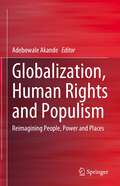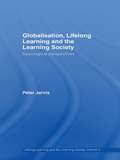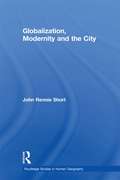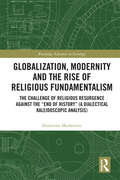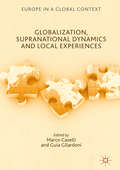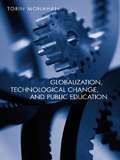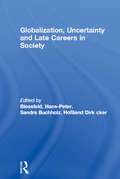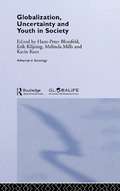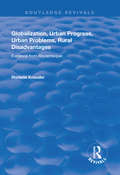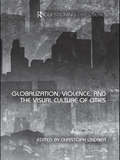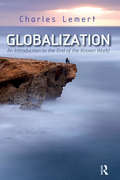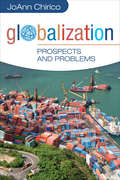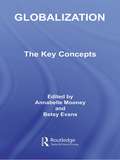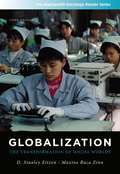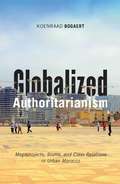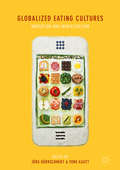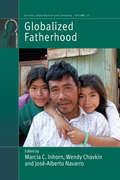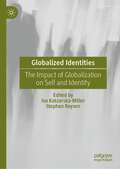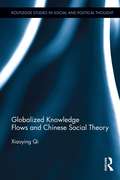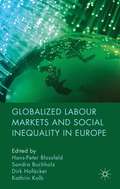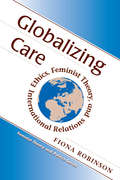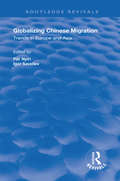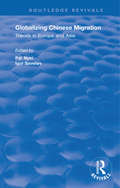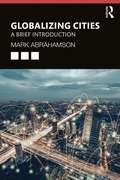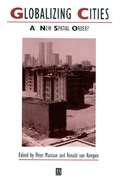- Table View
- List View
Globalization, Human Rights and Populism: Reimagining People, Power and Places
by Adebowale AkandeThis book offers a comprehensive and multidisciplinary global overview of populism and human rights in the light of globalization. It examines why the dominant (neo)liberal paradigm of the last decades resulted in major economic and social inequalities which resulted in the surge of national populism, led by the election success of right-wing parties, movements, and leaders across the world. It discusses, among other topics, the success of Brexit in Britain and the election success of Donald Trump and Marine Le Pen and explains why there is a need for a dialogue on human rights and globalization in this era of populism.Further contributions analyze various important topics of the field, including cross-culturalism, globalization, human rights, challenges and threats, diversity, curbing global corruption, sustainable development, populism, the decline of free speech, the new nationalism, internationalization, global regime of human rights, leadership theory, global management competencies, gender, quality management, individualism-collectivism, and examples of new initiatives in global organizations. This makes the book a valuable and useful resource for students, researchers, and scholars of international relations, political science, sociology, political psychology, law, diplomatic studies, Communication and media studies, economics, education and management, as well as practitioners and policy-makers interested in a better understanding of globalization, populism, and human rights.
Globalization, Lifelong Learning and the Learning Society: Sociological Perspectives (Lifelong Learning and the Learning Society)
by Peter JarvisThis book critically assesses the learning that is required and provided within a learning society and gives a detailed sociological analysis of the emerging role of lifelong learning with examples from around the globe. Divided into three clear parts the book: looks at the development of the knowledge economy provides a critique of lifelong learning and the learning society focuses on the changing nature of research in the learning society. The author, well-known and highly respected in this field, examines how lifelong learning and the learning society have become social phenomena across the globe. He argues that the driving forces of globalisation are radically changing lifelong learning and shows that adult education/learning only gained mainstream status because of these global changes and as learning became more work orientated.
Globalization, Modernity and the City (Routledge Studies in Human Geography)
by John Rennie ShortWe live in a world of big cities. Urbanization, globalization and modernization have received considerable attention but rarely are the connections and relations between them the subjects of similar attention. Cities are an integral part of the network of globalization and important sites of modernization. Globalization, Modernity and The City weaves together broad social themes with detailed urban analysis to explore the connections between the rise of big cities, the creation of a global network and the making of the modern world. It explains the growth of big cities, the urban bias of global flows and the creation of metropolitan modernities. The text develops broad theories of the subtle and complex interactions between urbanization, globalization and modernization in a sweep of the urban experience across the globe. Thematic chapters explore the making of the modern city in profiles of the growth of urban spectaculars, the role of flanerie, the traffic issues of the modernist city, recurring issues of urban utopias and the rise of the primate city. Detailed case studies are drawn from cities in Australia, China and the USA. Urban snapshots of cities such as Atlanta, Barcelona, Istanbul, Mumbai and Seoul provide a truly global coverage. The book links together broad social themes with deep urban analysis. This well-written, accessible and illustrated text will appeal to the broad audience of all those interested in the urban present and the metropolitan future.
Globalization, Modernity and the Rise of Religious Fundamentalism: The Challenge of Religious Resurgence against the “End of History” (A Dialectical Kaleidoscopic Analysis) (Routledge Advances in Sociology)
by Dimitrios MethenitisThe emergence of religious fundamentalism in a globalized, post-colonial world poses a significant challenge to the "End of History" narratives common in academic and non-academic literature alike. Globalization, Modernity and the Rise of Religious Fundamentalism proposes that we must seek new explanations for this phenomenon that recasts the relationship between globalization, modernity and religion. One model through which this possible is that of a dialectical kaleidoscopic methodology – one that applies a variety of theoretical tools and takes a truly multi-dimensional perspective. Through the overlapping and complementary approaches of systems theory, field theory and network theory, this book redefined the concepts of globalization, modernity and religion itself by challenging the inherent misconceptions of ethnocentric biases. It also provides a thorough historical analysis of religious systems from antiquity to the present to show the integration of modern and archaic elements within the structure of religious fundamentalism. Interdisciplinary in nature, Globalization, Modernity and the Rise of Religious Fundamentalism will appeal to students and researchers interested in fields such as geopolitics, history of race and ethnicity, postcolonialism, globalization and sociology of religion.
Globalization, Supranational Dynamics and Local Experiences (Europe in a Global Context)
by Marco Caselli Guia GilardoniThis edited collection focuses on concepts of globalization, glocalization, transnationalism and cosmopolitanism. The contributions provide evidence of how in practice, global dynamics and individual lives are interrelated. It presents theoretical reflections on how the local, the transnational and global dimensions of social life are entwined and construct the meaning of one another, and offers everyday examples of how individuals and organizations try to answer global challenges in local contexts. The book closely focuses on migration processes, as one of the main phenomena allowing a high number of people from contemporary society to directly experience supranational dynamics, either as migrants or inhabitants of the places where migrants pass through or settle down. Globalization, Supranational Dynamics and Local Experiences will be of interest to students and scholars across a range of disciplines, including sociology, migration studies and global studies.
Globalization, Technological Change, and Public Education
by Torin MonahanGlobalization, Technological Change, and Public Education documents the dramatic changes taking place in public education through the incorporation of new information technologies. These additions to the public school environment have generally been seen as enabling tools to help students and nations compete in the global marketplace. Yet a closer look at the interplay of technological change and organizational restructuring suggests the emergence of new, less promising power relations. Through detailed ethnographic research and interviews in the Los Angeles public school system, Torin Monahan reveals how, with few exceptions, these changes to the educational process are forcing both students and workers to adapt to systems that are ever more rigid and controlling.
Globalization, Uncertainty and Late Careers in Society (Routledge Advances in Sociology)
by Dirk Hofäcker Hans-Peter Blossfeld Sandra BuchholzGlobalization has been strongly shaping and transforming both national economies and individual careers in recent decades. These profound changes have had significant consequences for individual careers of men and women both during and after their employment career. This impressive new collection focuses on the effects of the globalization process on late-midlife workers and the exit from employment – a relationship that has up to now mostly been neglected in social science literature on aging and employment. The research documented within these pages poses several important questions: * Has globalization produced fundamental shifts in late-midlife workers’ labor market participation and late careers? * What transformations in old age career mobility can we observe? * How are these transformations filtered by different national institutional settings? With an impressive array of contributions, this volume will interest students and academics involved in the study of sociology, welfare and globalization.
Globalization, Uncertainty and Youth in Society: The Losers in a Globalizing World (Routledge Advances in Sociology)
by Melinda Mills Hans-Peter Blossfeld Erik Klijzing Karin KurzExamining how youths in fourteen industrialized societies make the transition to adulthood in an era of globalization and rising uncertainty, this collection of essays investigates the impact that institutions working with social groups of youths have upon those youths' abilities to make adult decisions determining their life courses. Covering both Europe and North America, the book includes case studies, and contains country-specific contributions on conservative, social-democratic, post-socialist, liberal and familistic welfare regimes, as well as data from the GLOBALIFE project. Filling the gap in the market on the micro effects of globalization on individuals, and taking an empirical approach to the topic, this impressive volume brings the individual and nation-specific institutions back into the discussion on globalization.
Globalization, Urban Progress, Urban Problems, Rural Disadvantages: Evidence from Mozambique (Routledge Revivals)
by Stefanie KnauderThis title was first published in 2000: This text demonstrates the mutual effects of, and interconnections between, globalization, urbanization and rural stagnation, both theoretically and empirically. It places its comprehensive empirical investigation on two levels of urbanization - the peri-urban and the fully urbanized areas - and includes the analysis of the rural conditions into the context of the Southern African region, and also into the context of global processes in an historical and interdisciplinary perspective. The text analyzes the magnitude of the two gaps and the process of social change between the three areas objectively, by showing the changing social interaction patterns, the differences in housing and other socio-economic variables, and subjectively, through showing the judgement of the people of these variables the degree of satisfaction and depression. As the majority of variables reveal poverty, the root causes for it in Mozambique, Africa and the Third World are analyzed and aspects of an alternative development and an alternative globalization are presented.
Globalization, Violence and the Visual Culture of Cities (Questioning Cities)
by Christoph LindnerWhat connects garbage dumps in New York, bomb sites in Baghdad, and skyscrapers in São Paulo? How is contemporary visual culture – extending from art and architecture to film and digital media – responding to new forms of violence associated with global and globalizing cities? Addressing such questions, this book is the first interdisciplinary volume to examine the complex relationship between globalization, violence, and the visual culture of cities. Violence – in both material and cultural forms – has been a prominent and endemic feature of urban life in the global metropolitan era. Focusing on visual culture and offering a strong humanities perspective that is currently lacking in existing scholarship, this book seeks to understand how the violent effects of globalization have been represented, theorized, and experienced across a wide range of cultural contexts and urban locations in Asia, Europe, North and South America, and the Middle East. Organized around three interrelated themes – fear, memory, and spectacle – essay topics range from military targeting in Baghdad, carceral urbanism in São Paulo, and the Paris banlieue riots, to the security aesthetics of G8 summits, the architecture of urban paranoia, and the cultural afterlife of the Twin Towers. Globalization, Violence, and the Visual Culture of Cities offers fresh insight into the problems and potential of cities around the world, including Beijing, Berlin, London, New York, Paris, and São Paulo. With specially-commissioned essays from the fields of cultural theory, architecture, film, photography, and urban geography, this innovative volume will be a valuable resource for students, scholars, and researchers across the humanities and social sciences.
Globalization: An Introduction to the End of the Known World
by Charles C. Lemert"Globalization: An Introduction to the End of the Known World" surveys the history of globalization from the earliest of ancient texts through contemporary debates and the prospects for anticipating the new worlds to come. At the end of the twentieth century, debates over the nature of globalization were unable to agree on a simple resolution, except to say that globalization is economic, political, and cultural all at once. Cultural globalization affects everyone with a smartphone, on which global youth from Los Angeles to Jakarta listen to Jay-Z and Beyonce. States are torn in several directions at once by unsettling economic, political, and cultural forces. Lemert concludes with a serious outline of the possible ways of imagining what the still-unknown global world will become next ways including optimism, caution, and skepticism."
Globalization: Prospects and Problems
by Joann A. ChiricoGlobalization: Prospects and Problems, by JoAnn Chirico, provides a comprehensive and enlightening overview of globalization issues and topics. Emphasizing the theory and methods that social scientists employ to study globalization, the text reveals how macro globalization processes impact individual lives—from the spread of scientific discourse to which jobs are more or less likely to be offshored. The author presents a clear image of “the big globalization picture” by skillfully exploring, piece by piece, a myriad of globalization topics, debates, theories, and empirical data. Compelling chapters on theory, global civil society, democracy, cities, religion, institutions (sports, education, and health care), along with three chapters on global challenges, help readers develop a broad understanding of key topics and issues. Throughout the text, the author encourages readers to relate their personal experiences to globalization processes, allowing for a more meaningful and relevant learning experience.
Globalization: The Key Concepts (Routledge Key Guides)
by Annabelle Mooney Betsy EvansViewed as a destructive force or an inevitability of modern society, globalization is the focus of a multitude of disciplines. A clear understanding of its processes and terminology is imperative for anyone engaging with this ubiquitous topic. Globalization: the Key Concepts offers a comprehensive guide to this cross-disciplinary subject and covers concepts such as: homogenization neo-Liberalism risk knowledge society time-space compression reflexivity. With extensive cross-referencing and suggestions for further reading, this book is an essential resource for students and interested readers alike as they navigate the literature on globalization studies.
Globalization: The Transformation of Social Worlds (Third Edition)
by D. Stanley Eitzen Maxine Baca ZinnThis popular and thought-provoking reader collects interesting and insightful articles that explore the process of globalization and how it shapes societies and groups. The articles, which reflect a wide variety of concerns and perspectives, are drawn from both scholarly and popular sources.
Globalized Authoritarianism: Megaprojects, Slums, and Class Relations in Urban Morocco (Globalization and Community #27)
by Koenraad BogaertA rich investigation into Morocco&’s urban politics Over the past thirty years, Morocco&’s cities have transformed dramatically. To take just one example, Casablanca&’s medina is now obscured behind skyscrapers that are funded by global capital and encouraged by Morocco&’s monarchy, which hopes to transform this city into a regional leader of finance and commerce. Such changes have occurred throughout Morocco. Megaprojects are redesigning the cityscapes of Rabat, Tangiers, and Casablanca, turning the nation&’s urban centers into laboratories of capital accumulation, political dominance, and social control.In Globalized Authoritarianism, Koenraad Bogaert links more abstract questions of government, globalization, and neoliberalism with concrete changes in the city. Bogaert goes deep beneath the surface of Morocco&’s urban prosperity to reveal how neoliberal government and the increased connectivity engendered by global capitalism transformed Morocco&’s leading urban spaces, opening up new sites for capital accumulation, creating enormous class divisions, and enabling new innovations in state authoritarianism. Analyzing these transformations, he argues that economic globalization does not necessarily lead to increased democratization but to authoritarianism with a different face, to a form of authoritarian government that becomes more and more a globalized affair.Showing how Morocco&’s experiences have helped produce new forms of globalization, Bogaert offers a bridge between in-depth issues of Middle Eastern studies and broader questions of power, class, and capital as they continue to evolve in the twenty-first century.
Globalized Eating Cultures: Mediation and Mediatization
by Jörg Dürrschmidt York KauttThis innovative volume explores the link between local and regional eating cultures and their mediatization via transnational TV cooking shows, glocal food advertising and social media transfer of recipes. Pursuing a global and interdisciplinary approach, it brings together research conducted in Latin America, Australia, Africa, Asia and Europe, from leading scholars in sociology and political science, media and cultural studies, as well as anthropology. Drawing on this rich case study material facilitates a revealing and engaging analysis of the connection between the meta-concepts of globalization and mediatization. Across fifteen chapters its authors provide fresh insights into the different impact that food and eating cultures can have on the everyday mediation of ethnicity and class as well as local, regional and transnational modes of belonging in a media rich global environment. This exciting addition to the food studies literature will appeal in particular to students and scholars of sociology, anthropology, media and cultural studies.
Globalized Fatherhood
by Marcia C. Inhorn José-Alberto Navarro Wendy ChavkinUsing an entirely new conceptual vocabulary through which to understand men's experiences and expectations at the dawn of the twenty-first century, this path-breaking volume focuses on fatherhood around the globe, including transformations in fathering, fatherhood, and family life. It includes new work by anthropologists, sociologists, and cultural geographers, working in settings from Peru to India to Vietnam. Each chapter suggests that men are responding to globalization as fathers in creative and unprecedented ways, not only in the West, but also in numerous global locations.
Globalized Identities: The Impact of Globalization on Self and Identity
by Iva Katzarska-Miller Stephen ReysenThis book explores the impact of globalization on self and identity from multidisciplinary perspectives. Chapters cover a variety of topics including the impact of cultural inertia on intergroup relations, global consumer identity, radicalization, evolving national identities, young people’s negotiations of different cultural identities, the emergence of all inclusive global identities, and the impact of global citizenship education on global identity. This collection will be of value to scholars and students from across the social sciences.
Globalized Knowledge Flows and Chinese Social Theory: Globalized Knowledge Flows And Chinese Social Theory (Routledge Studies in Social and Political Thought #83)
by Xiaoying QiThis book considers the nature and possibilities of conceptual change and transformation under conditions of globalization, especially with regard to Chinese social and cultural concepts. It argues that the influence of globalization promotes the spread of West European and American social science concepts and methods at the expense of local concepts and approaches, and at the same time (paradoxically) provides opportunities for the incorporation of local concepts, including Chinese concepts, into Western or mainstream social science.
Globalized Labour Markets and Social Inequality in Europe
by Gosta Esping-Andersen Hans-Peter Blossfeld Sandra Buchholz Dirk Hof�cker Kathrin KolbBased on contributions from international experts, this volume provides an up-to-date account of globalization's influences on individual life courses in nine different modern societies, and of cross-nationally varying political strategies to mediate this influence.
Globalizing Care: Ethics, Feminist Theory, and International Relations (Feminist Theory and Politics)
by Fiona Robinson<p>Although there is excellent work being done on ethics/normative theory and international relations and on gender/feminist theory and international relations, very little is available that seeks, explicitly, to integrate the two fields. Moreover, while feminist ethics, which explore the theory of care and noncontractual values such as trust and responsibility, are increasingly linked to political theory, there appears to be a reluctance to relate this moral theory to the specific questions of international or global political theory. <p>In Globalizing Care, Fiona Robinson successfully weaves feminist theory and ethics with international relations. By bringing in the important contributions of feminist moral and political theorists, contributions that are notably absent from most of the important work in this field, Robinson broadens the debate on normative theory in international relations. This text will be essential reading for students and scholars of gender or feminist studies, international relations, philosophy, and political theory and of special interest to scholars of feminist, moral, and political philosophy.</p>
Globalizing Chinese Migration: Trends in Europe and Asia
by Pál Nyíri Igor SavelievThis title was first published in 2003. Globalizing Chinese Migration is the first volume to deal comprehensively with the most recent wave of the migration from the People's Republic of China to Europe and Asia. By analyzing the Chinese state’s role in this migration, the authors dismiss as fiction the theory (sometimes advanced by hostile and racist foreign observers) that Chinese authorities are intent on using mass emigration as an expansionist tool. They go on to explain that migrants who might, in earlier times, have been reviled as traitors and absconders are today more likely to be viewed by sections of the Chinese state bureaucracy as patriots who remain part of China’s polity and economy and contribute to its standing overseas. Some senior officials, however, particularly diplomats, stress the harm done by new migrants, both to China’s economy (which loses assets as a result of the migrants’ entrepreneurial activities) and to its reputation in the world. An essential resource for academics and students alike, the volume presents important new data on aspects of Chinese migration largely neglected in the existing English-language literature. These include new forms of emigration from China (by students and by workers from the country’s north-eastern provinces) and emigration to destinations (including Russia, Southeast Asia, and Japan) normally unremarked by students of population movements.
Globalizing Chinese Migration: Trends in Europe and Asia
by Pál Nyíri Igor SavelievThis title was first published in 2003. Globalizing Chinese Migration is the first volume to deal comprehensively with the most recent wave of the migration from the People's Republic of China to Europe and Asia. By analyzing the Chinese state’s role in this migration, the authors dismiss as fiction the theory (sometimes advanced by hostile and racist foreign observers) that Chinese authorities are intent on using mass emigration as an expansionist tool. They go on to explain that migrants who might, in earlier times, have been reviled as traitors and absconders are today more likely to be viewed by sections of the Chinese state bureaucracy as patriots who remain part of China’s polity and economy and contribute to its standing overseas. Some senior officials, however, particularly diplomats, stress the harm done by new migrants, both to China’s economy (which loses assets as a result of the migrants’ entrepreneurial activities) and to its reputation in the world. An essential resource for academics and students alike, the volume presents important new data on aspects of Chinese migration largely neglected in the existing English-language literature. These include new forms of emigration from China (by students and by workers from the country’s north-eastern provinces) and emigration to destinations (including Russia, Southeast Asia, and Japan) normally unremarked by students of population movements.
Globalizing Cities: A Brief Introduction
by Mark AbrahamsonGlobalization has been built upon, and maintained by, major urban centers. As the interconnections among these cities grow, more cities become involved as important global nodes, and globalization has an extremely strong influence upon the forms and functions of cities everywhere. This new textbook examines modern cities worldwide through two lenses: as the major nodes in the global economy, and as primary propagators of cultural ideas across the world. Exploring the ramifications of the continuing penetration of global forces into smaller urban areas, this book clearly distinguishes economic, cultural, and political processes to demonstrate how global attachments are shaping many of the basic features of modern cities. Specifically, the book examines the way cities accommodate huge global flows of people, including migrants, tourists, and the managers of multi-national firms, and the effects this has upon the cultural, economic, and political forces associated with globalization in cities. The main features of the book include: a balanced emphasis upon how economic, technological, and cultural forces shape both urban and global developments; a highly interdisciplinary focus, incorporating major works and ideas from urban scholars writing in sociology, geography, anthropology, and politics; detailed case studies of events and activities within specific cities and regions that illuminate major trends; end of chapter reading lists of corresponding chapters in The Globalizing Cities Reader, second edition, edited by Xuefei Ren and Roger Keil and published by Routlegde in 2018. Written in a clear and accessible style, Globalizing Cities: A Brief Introduction will appeal to advanced undergraduate and postgraduate students in both urban and globalization courses within sociology, geography, and urban studies.
Globalizing Cities: A New Spatial Order? (IJURR Studies in Urban and Social Change Book Series)
by Ronald Van Kempen Peter MarcuseThis exciting collection of original essays provides students and professionals with an international and comparative examination of changes in global cities, revealing a growing pattern of social and spatial division or polarization.
